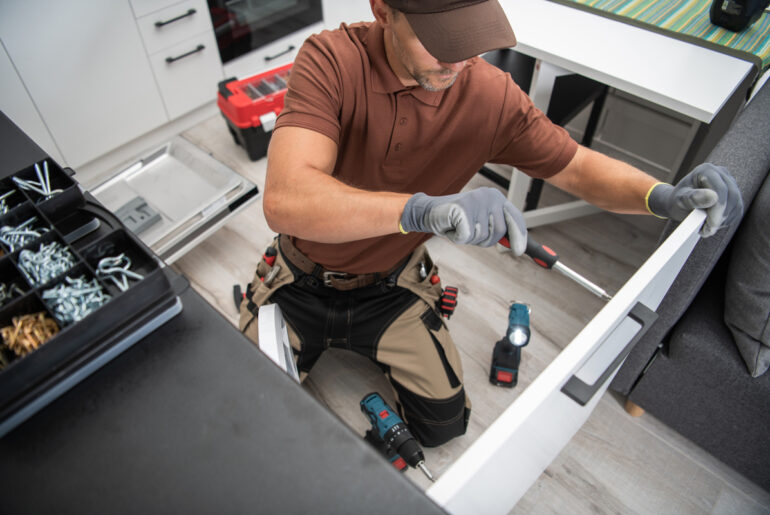Have you been thinking about starting a handyman business but don’t see yourself as an entrepreneur? The good news is that you don’t have to be an entrepreneur. All you need is the commitment and skills.
In this article, we will discuss 10 handyman skills you need to succeed in starting and running your handyman business.
1. Technical Skills Required
More important than running your handyman business is knowing how to complete the tasks of a handyman. You need to know how to complete tasks that customers ask for. These tasks could range from snaking a drain to hanging a picture on the wall.
The key to excellent technical skills is to choose a set of skills you’re good at and stick to those. In the early days of your handyman business, it is helpful to create a handyman skills list. With this list, you can narrow your services down and offer only what you’re the best at.
Another tip is to learn what services clients are looking for. Consider the area you live in as a starting point. Rural areas may need a handyman to unclog the sink or repair floors in their home. In an urban area, clients may want a handyman to paint the kitchen or hang a light fixture.
2. Excellent Communication Skills
Your business may not go well if you only have technical skills but no communication skills. It is essential to hone your communication skills, whether in the field or the office.
Communication can be difficult, but when you and the client communicate well you know everyone is on the same page. Clear communication means jobs move faster and fewer mistakes are made. In the end, you haven’t wasted money, and the client is happy.
Steps for having good communication start with mapping out each stage of a project, so your client knows exactly what to expect. Be consistent by following up with your clients at each stage.
- When a client sends an inquiry email, send them a follow-up email within 24 to 48 hours. Your email should include a call to action for scheduling a consultation or a quote for the job.
- Always follow up with a client after sending a quote. This way, you can book a consultation or close the sale.
- Send appointment reminders by email, text, or phone calls.
- Always provide an invoice immediately after the project is completed.
Good communication skills will build your reputation as a reputable service provider. If you have trouble in this department, there are apps and software available to make your life easier.
3. Customer Service Skills
The importance of customer service is often forgotten in the handyman business. What we know is that where there are excellent communication skills, there is an opportunity for growth.
Clients will pay more for great customer service and become regular customers. With that in mind, remember that customer service is a broad skill set, and it’s okay to start out small. Start with being transparent. Let your clients know exactly what they should expect when working with you.
Always deliver what you promised. Follow through on your job outline. Do what you say you’re going to do.
Even handymen must be professional. Your handyman service should have insurance and a license. Create a customer service policy, have a warranty option, and develop an online presence.
The key is to create a set of expectations and stick to them. Make sure working with you is a pleasant experience. Providing a professional and clear job outline can create recurring clients and positive remarks online and by word of mouth.
4. Digital Marketing
Handyman services can benefit from digital marketing. Digital marketing is any type of marketing done through a device or the internet.
A great way to market your business is by using email marketing. There is minimal effort involved, and it can be automated. Some email software can integrate with Handyman software.
Other avenues to market your business are social media or creating a business website. If this is not in your skillset, team up with a digital marketer to create an irresistible ad campaign.
Marketing in the 21st century is more than an ad in the newspaper or a billboard sign. You have the ability to get your name to millions of people just by using a device or the internet.
Successfully marketing your handyman business means going where the people are, whether they are on their devices or online.
5. Organization
Practicing organization is critical to completing jobs on time and keeping customers happy. Sometimes, that clipboard and paper won’t cut it. Don’t stress out, though, because there are fantastic ways to take your organization to the tech field.
Using a handyman app can help you stay on task and keep you from forgetting important details regarding your current job. Using a handyman app puts all the information you need at your fingertips.
You don’t want to show up at a job without the proper tools or your list of instructions. Bad organization leads to confusion, which makes jobs take longer than expected. Business owners may have to spend more money fixing issues that could have been avoided with a little organization.
6. Budgeting
The first step to budgeting is to open a separate business account at the bank. In the beginning, deposit all profits into that account. You can then take an owner’s draw each month. This is when you pay yourself.
Don’t wait too long to create a budget. A sustainable budget creates the right conditions for growth. Having a solid business is about revenue and profit. Take the time to list what materials cost and what number your profit needs to sit at.
If this is not a skill you are comfortable with, you can team up with someone who is knowledgeable to guide you.
7. Scheduling
Scheduling is a basic handyman skill that gives you flexibility and control. In days gone by, scheduling included paper and pen. Today, handymen can automate their scheduling and spend more time and energy on the work at hand.
Handyman software is useful for dispatching employees and getting a better idea of what the day-to-day happenings are. Using scheduling software allows you to spend more time improving your bottom line and less time looking for a pen.
8. Working with a Team
If you think you can run and work your business alone, then you might be in for a shocker. Building a business and increasing your profit margins are best done with a team. A team can keep a business efficient and running smoothly.
The perks of working with a team are that each member has different skill sets. This can be a huge advantage over your competitors. Working with tech-savvy members can keep daily tasks running smoothly. Fellow handymen can build your list of services by using skills you don’t have.
8. Hiring
Every business owner will reach a point when hiring more employees is essential. Hiring one or more employees can give you more time in the office. That means you have more time to focus on your business.
Hiring an employee can be a scary thing. The key is to develop your process and stick with it. But, be willing to change it if it’s not working. Use a standard job listing and see who walks through the door. You might feel the need to tweak your job description.
Interview each person and score them based on their answers. Narrow potential candidates down and take them into the field for a technical interview.
10. How to Say “No”
Of all the handyman skills listed, this may be the hardest to learn. It would seem that having numerous clients is great, but dangers arise when you have too many clients.
Having more clients than you can handle efficiently leads to sloppy work. You may find yourself working outside of your field of expertise. When this happens, it is time to learn how to say no.
You might be thinking this is crazy because more money is good, right? This is not exactly true.
The handyman business offers a broad spectrum of services, and to perform those services, you need permits and licenses. Too many clients could cause you to overstep the boundaries leaving you with hefty fines to pay.
What about clients or projects that just don’t fit your business model? Taking on a project that takes longer than you expected alters your pricing strategy. In the end, you spend more money than expected, therefore, decreasing your profits.
It is okay to decline a project respectfully. When you need to do this, you can refer them to someone else in your field.
Getting to Work
You don’t have to be an entrepreneur or have a degree in business administration to have a successful handyman business. What you do need is a commitment to learning handyman skills you may be weaker at. Hopefully, with our handyman skills checklist, you can build a sustainable and successful business.



![How to Start a Handyman Business [9 Steps]](https://insights.workwave.com/wp-content/uploads/2021/01/bricklayer-holding-construction-tools-picture-id901089886-770x515.jpg)